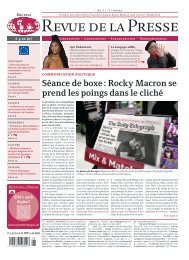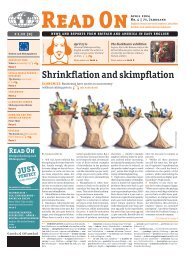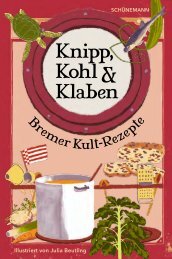Read On nach Bildungsplan
Sie wollen auch ein ePaper? Erhöhen Sie die Reichweite Ihrer Titel.
YUMPU macht aus Druck-PDFs automatisch weboptimierte ePaper, die Google liebt.
April 2023
Nr. 4 | 70. Jahrgang
Englisch lernen mit leicht lesbaren, aktuellen
Artikeln und ausführlichem Vokabular
€ 2,50 [D]
NEWS AND REPORTS FROM BRITAIN AND AMERICA IN EASY ENGLISH
Themen nach Bildungsplänen
LITERATURE
Roald Dahl’s books
to remain unchanged
Page 2
FOOD • BUSINESS
An American dish in Paris
Macaroni and cheese recipe
LANGUAGE CORNER
French in the English
language
Page 3
ECOLOGY • TECHNOLOGY
Making hydropower more
fish-friendly
SPORT • ENTERTAINMENT
Ryan Reynolds bought a
Welsh football club
Page 6
70 Jahre
Young people and television
Page 7
ANIMALS
Wally the Alligator
Page 8
A2–B1
Die Sprachzeitung nach
Bildungsplan!
examples include:
AKTUELLE THEMEN UND
EREIGNISSE
Silicon Valley Bank collapse
page 1
ESSKULTUR • REZEPTE
An American dish in Paris
Macaroni and cheese
page 3
€ 3,00 [a,b] CHF 4,90 [ch]
| Photo: Getty Images
Cash is king in a new
trend on TikTok. Cash stuffing –
putting money for different things in
different envelopes – can make
managing your finances fun.
Read more onpage 4
0 – 1 COLLAPSE “k´"lœps‘ — economics “Æik´"nÅm
Iks‘ Volkswirtschaft — banking Bankwesen — success
“s´k"ses‘ Erfolg — (bank) run Bank Run; Ansturm
der Einleger(innen) auf eine Bank — innovation
“ÆIn´"veIS´n‘ — wealth “welT‘ Reichtum — to
get turned into s.th. in etw. umgesetzt werden
2 – 3 to deposit money “dI"pÅzIt‘ Geld einlagern
— decade “"dekeId‘ Jahrzehnt — (to be) worth ...
“w‰…T‘ ... wert (sein) — billion Milliarde — vault
“vÅlt‘ Tresorraum
4 – 5 share Anteil — deposit Einlage — long-dated
… … mit langer Laufzeit — Treasury bonds
“"treZ´ri‘ Staatsanleihen — mortgage bonds “"mO…
gIdZ‘ Pfandbriefe — modest “"--‘ mäßig — steady
“"stedi‘ stabil — returns Erträge — interest rates
American children
will be searching for something
“eggs pensive” at the Easter egg
hunt this year. The price of eggs
in the US has gone up.
Read more on page 5
Silicon Valley Bank collapse
ECONOMICS • BANKING • TECH The success of Silicon Valley made
SVB one of the US’s biggest banks. Until there was a run on it.
By Siobhan Bruns
| Photo: Getty Images
1 WHEN YOUthink
of Silicon Valley, you
think of technology, innovation
and, of course, wealth.
In that part of California, technological
ideas get turned into companies,
and some of those companies
become successful. And
some of those successful companies
make money – a lot of it.
2 Wealthy Silicon Valley tech
companies need a place to deposit
all that money. Many of
them did so at Silicon Valley Bank
(SVB). In just a few decades, SVB
grew to become the 16th-largest
bank in the US, worth more than
$200 billion.
3 But although customers had
given SVB a lot of money, the
bank didn’t just leave all the money
in a vault in the bank – most
banks don’t. Like many other
banks, SVB used that money to
make more money for its investors.
4 The New York Times writes
that SVB “put a large share of
customer deposits into long-dated
Treasury bonds and mortgage
bonds which promised modest,
steady returns when interest
rates were low”.
5 That worked very well for
some time. In 2021, SVB deposits
were $189.2 billion, up from $49
billion in 2018. Those who had invested
with the bank had made a
lot of money.
6 However, about a year ago,
the Federal Reserve began to
raise interest rates to fight inflation.
SVB had bought a lot of
bonds just before that happened.
The higher interest rates made
the bonds that SVB had just
bought be worth much less.
7 It seems customers got nervous
about the bad investment and
went to SVB to take their money
out of the bank; in other words,
there was a run on the bank. A run
on a bank, or a bank run, happens
when a lot of people are afraid a
bank will lose their money or go
out of business, and they all go to
the bank to get back their money.
8 That’s what happened at SVB
on March 10, when “depositors
tried to pull $42 billion from SVB
in one of the biggest US bank runs
in more than a decade”, Fortune
magazine writes. Because the
bank did not have that money
readily available to give to everyone
who was asking for it, it collapsed.
9 “The bank was then closed by
the California DFPI and placed
into FDIC receivership, marking
the biggest failure of a US
bank since the financial crisis [of
2008]”, Fortune writes.
10 Bank runs can be very dangerous
to the economy. A bank run
at one bank can cause a panic and
set off bank runs at other banks.
Zinsen
6 – 8 Federal Reserve “Æfed´r´l rI"z‰…v‘ US-Notenbank
— to raise s.th. etw. erhöhen — inflation
“In"fleIS´n‘ — bad investment Fehlinvestition — to
go out of business in Konkurs gehen — depositor
“-"---‘ Einleger(in) — to pull (money) (Geld) abziehen
— to have s.th. readily available etw. ohne
Weiteres zur Verfügung haben — to collapse zusammenbrechen
9 – 10 DFPI = Department of Financial Protection
and Innovation “faI"nœnS´l pr´"tekS´n‘ Ministerium
für Verbraucherschutz in Finanzfragen — to
place s.th. into receivership “rI"si…v´SIp‘ etw. unter
Zwangsverwaltung stellen — FDIC = Federal Deposit
Insurance Corporation “In"SO…r´ns ÆkO…
| Photo: Getty Images
And that would put the economy
into a tailspin.
11 To stop that from happening,
the American government
stepped in. President Joe Biden
said the government will make
sure that all SVB customers get
their money back. “Americans
can rest assured that our banking
system is safe”, Biden said.
12 But he also said that the government
would not help everyone
involved in the collapse: “the
management of these banks will
be fired … investors in the banks
will not be protected. They knowingly
took a risk and when the risk
didn’t pay off, investors lost their
money. That’s how capitalism
works”, Biden said.
p´"reIS´n‘ unabhängige Behörde zur Wahrung eines
stabilen Finanzsystems — to mark bedeuten —
failure “"feIlj´‘ Scheitern — financial crisis
“"kraIsIs‘ Finanzkrise — economy “i"kÅn´mi‘ Wirtschaft
— to cause s.th.; to set s.th. off etw. auslösen
— to put s.th. into a tailspin (fig) etw. ins
Schleudern bringen
11 – 12 government Regierung — to step in einschreiten
— to rest assured that … “´"SO…d‘ (fig)
versichert sein, dass … — (to be) involved in s.th.
“In"vÅlvd‘ an etw. beteiligt sein — management
Führung — to fire s.o. jdn. entlassen — to protect
s.o. “-"-‘ jdn. schonen — knowingly wissentlich —
to take a risk (fig) ein Risiko eingehen — to pay off
sich auszahlen — capitalism “"kœpIt´lIz´m‘
2
april 2023 Read On
Classic children’s books
to stay the same
LITERATURE After a backlash, Roald Dahl’s publisher
will no longer change all new editions of his books.
mit Audiodatei
By Siobhan Bruns
1 ROALD DAHL,author of
Charlie and the Chocolate Factory
and Matilda, wrote his first popular
children’s book, James and
the Giant Peach, in 1961. Kids who
read his books today are reading
the exact same Dahl books
their parents, grandparents, and
maybe even great-grandparents
read when they were growing up.
But the publisher of Roald Dahl’s
books, Puffin Books, had plans to
change that.
2 Puffin Books hired a firm
called Inclusive Minds to read
Dahl’s books to see if they were
fit for today’s market. Inclusive
Minds uses what is called sensitivity
readers. They go through
books to find things they think
are offensive to modern readers
and tell the publisher how things
should be written.
3 In Dahl’s books, they found a
lot to be offended by: in at least 10
of Dahl’s 19 children’s books, Puffin
changed hundreds of words,
the Telegraph newspaper reported.
In some places, they even
added text that Dahl, who died in
1990, never wrote.
4 Among the many changes
made were words used to describe
people. The word “fat”
– used to describe Augustus
Gloop in Charlie and the Chocolate
Factory – was changed to
“enormous”. Genders were also
changed: Oompa-Loompas be-
came “small people” instead of
“small men”.
5 Not only were a lot of Dahl’s
words changed, but the publisher
also added content that was not
originally written by Dahl. For
example, in his 1983 book The
Witches, Dahl wrote that witches
always wear wigs because they
are bald. According to The Telegraph,
a new sentence was added
Roald Dahl
wrote many
popular children’s
books. | Photo:
Getty Images
|Photo: Unsplash/Nick Fewings
that said: “There are plenty of
other reasons why women might
wear wigs and there is certainly
nothing wrong with that”.
6 The publisher was ready to
print all new editions of Dahl’s
books with these changes. But
people weren’t happy. There was
a backlash against the changes
on social media, in the press, and
even in Buckingham Palace.
7 The novelist Salman Rushdie
went on Twitter to call the changes
“absurd censorship”. Newspapers
wrote about the story, and
people complained in the comment
sections. Others pointed
out changing words to make
them “nicer” can affect the storytelling.
Dahl often had villains in
his stories, like Miss Trunchbull in
Matilda and Mr Twit in The Twits.
8 Matthew Dennison, who wrote
a biography about Dahl, said: “If
you soften or make bland some
of those choices of language then
perhaps you undermine the badness
of the so-called bad characters,
which pulls the rug from
under the plot. So I think it is
perfectly possible that changes to
Dahl’s wording actually somehow
shrink the impact of the stories,
make the stories less powerful.”
9 Even the Queen Consort,
Camilla, didn’t like it. After learning
of the changes that were to
be made to the books, she told a
group of authors to “please remain
true to your calling, unimpeded
by those who may wish to
curb the freedom of your expression
or impose limits on your imagination”.
10 The backlash was so great
that Dahl’s publishers backtracked.
They said they now saw
“the importance of keeping Dahl’s
classic texts in print”. Francesca
Dow, a managing director for
the books’ publisher, said readers
could now choose to read the
original or buy re-edited versions
of Dahl’s books.
0 – 2 CLASSIC CHILDREN’S BOOKS Kinderbuchklassiker —
backlash (heftige) Kritik — publisher Verlag — edition Ausgabe
— James and the Giant Peach “"dZaI´nt‘ dt. Titel: James und
der Riesenpfirsich — to hire s.o. jdn. engagieren — firm Firma
— sensitivity reader “ÆsensI"tIv´ti‘ Lektor(in), der/die Werke auf
diskriminierende Inhalte prüft (s. Sensibilität) — offensive “-"--‘
beleidigend, anstößig
3 – 6 to be offended by s.th. “-"--‘ an etw. Anstoß nehmen —
enormous riesig — gender Geschlecht — content Inhalt(e) —
originally “´"rIdZ´n´li‘ ursprünglich — The Witches dt. Titel:
Hexen hexen — wig Perücke — bald glatzköpfig — according to
laut — plenty of viele
7 novelist “"nÅv´lIst‘ Romanautor(in) — censorship Zensur
— to complain sich beschweren — comment section Kommentarbereich
— to point s.th. out auf etw. hinweisen — to affect
s.th. etw. beeinträchtigen — storytelling Erzählen — villain
“"vIl´n‘ Bösewicht — The Twits dt. Titel: Die Zwicks stehen Kopf
8 bland nichtssagend, fade — choice of language Wortwahl
— to undermine untergraben — to pull the rug from under
s.th. (fig) etw. den Boden unter den Füßen wegziehen — wording
Formulierung — to shrink mindern — impact Wirkung
9 Queen Consort Königsgemahlin — to remain true to s.th.
einer Sache treu bleiben — calling Berufung — unimpeded
“ÆønIm"pi…dId‘ ungehindert — to curb einschränken — freedom of
expression Redefreiheit — to impose limits on s.th. etw. Grenzen
auferlegen — imagination Vorstellungskraft
10 to backtrack (fig) zurückrudern — importance Bedeutsamkeit
— managing director Geschäftsführer(in) — re-edited
überarbeitet
Eintritt
frei
21. /22. April 2023
CGM ARENA Koblenz
www.azubitage.de
Fr. 09 bis 14 Uhr
Sa. 10 bis 15 Uhr
Wir wünschen Ihnen
frohe Ostern!
Ihr Sprachzeitungsteam
Unsere Bestseller
fürs Osternest.
• Die Sprachzeitung •
www.sprachzeitungen.de
Read On erscheint 1 × monatlich in der
Carl Ed. Schünemann KG
· Die Sprachzeitung ·
Schünemann-haus
28174 Bremen
Telefon: +49(0)421.36903-76
Fax: +49(0)421.36903-48
www.sprachzeitungen.de
info@sprachzeitungen.de
Verantwortliche Redakteurin
Siobhan Bruns
Redaktionsleitung Sprach zeitungen
Melanie Helmers
Redaktion
Sebastian Stumpf
Franziska Lange
Aletta Rochau
Jessica Stuart
Marcus Lachmund (Didaktik)
Jennifer Kerr (Didaktik)
Oliver Voigt (Didaktik)
Gestalterische Konzeption
www.bmalx.de
Layout & Umbruch
Johanna Guhl, Britta Leuchtmann,
John Miller
impressum ISSN 0935-7696
Druck
Druckzentrum Nordsee GmbH
Copyright aller Artikel Carl Ed. Schünemann
Verlag KG. Abdruck nur mit Genehmigung.
Copyright strictly reserved under the Berne
Convention © 2023
Kündigungs bedingungen
Nach Ablauf des ersten Bezugsjahres ist das
Jahresabo monatlich kündbar.
Das Schnupperabo geht über in ein Jahresabo,
wenn es nicht spätestens einen Monat vor
Ablauf gekündigt wird. | Es gelten unsere
aktuellen AGB.
Datenschutz
Die personenbezogenen Daten werden auf
der Basis der geltenden Datenschutzgesetze,
insbesondere der EU-Datenschutzgrundverordnung
(DSGVO) sowie des Bundesdatenschutzgesetzes
(BDSG), zweckgebunden
erhoben und verarbeitet. Wir geben Ihre Daten
nur weiter, soweit ein Gesetz dies vorschreibt
oder wir Ihre Einwilligung eingeholt haben.
Die personenbezogenen Daten sind für die
Lieferung Ihrer Sprachzeitung erforderlich.
Unsere Informationen zum Datenschutz nach
Art. 13 und Art. 14 der EU-DSGVO können
Sie über unsere Kontaktdaten einsehen oder
anfordern.
Read On April 2023 70 Jahre
3
macaroni and cheese
An American dish in Paris
FOOD • BUSINESS
Macaroni and cheese has been a staple of the American dinner table
for a very long time. Now it’s fashionable in Paris.
By Siobhan Bruns
1 LONG A FAVOURITEin
the US and the UK, macaroni
and cheese is now also a hit in
France. Normally, things are the
other way round, of course – usually,
it’s French cuisine that’s the
height of fashion in the Englishspeaking
world. And the French
palate is thought to be far better
than the Anglo-Saxon palate.
But the craze for mac and cheese
there is actually based on American
and British tastes.
2 Food delivery companies in
France analysed “home delivery
data from the US and the UK
to see what the British and the
Americans like to order and to
offer something similar to the
0 AN AMERICANdish in Paris vgl. An American in
Paris Komposition für Orchester von George Gershwin
aus dem Jahr 1928 — staple fester Bestandteil — fashionable
“"fœS´n´b´l‘ in Mode
1 to be the height of fashion “haIt‘ (fig) groß in
Mode sein — palate “"pœl´t‘ Gaumen — Anglo-Saxon
“ÆœNgl´U"sœks´n‘ angelsächsisch — craze for s.th. Begeisterung
für etw. — taste “teIst‘ Geschmack
2 – 3 similar “"sImIl´‘ ähnlich — in this case in diesem Fall
— traditionalist “tr´"dIS´n´lIst‘ — evil “"i…v´l‘ Übel — to
support “s´"pO…t‘ unterstützen — to recover sich erholen
French – in this case macaroni
with different types of cheese,
such as Emmental, Boursin or
Saint-Marcellin”, the Times
writes.
3 French traditionalists may
see this as a capitalist evil, but
the company behind the mac and
cheese craze, Clone, says it wants
to support local restaurants,
which lost business during the
pandemic and have not fully recovered,
by helping them get into
the food delivery business.
4 And the company believes
that even though they have a
bad reputation in France when
it comes to food, the British and
the Americans are ahead of the
culinary game. Investors seem to
agree; the Times writes that the
Perhaps
someday
alongside croissants
and coq
au vin, French
cafés will
serve mac and
cheese.
| Photo:
Getty Images
start-up has raised €105 million
since it was started two years
ago.
5 There’s one thing macaroniand-cheese-eating
Americans
and French anti-capitalists can
probably agree on, however: the
price of the dish in France is too
high.
6 A box of Kraft Mac & Cheese
– which made its debut in the
US during the Great Depression
when real cheese was unaffordable
and has been a top seller ever
since – includes noodles plus
a packet of orange processed
cheese powder and costs $1 at
Walmart. In Paris, a small bowl
of macaroni and cheese costs
¤13. Ooh la la!
4 – 5 even though “D´U‘ obwohl — to have a bad reputation
“Ærepj´"teIS´n‘ einen schlechten Ruf haben — when it
comes to ... was ... anbelangt — to be ahead of the (culinary)
game “"kølIn´ri‘ (fig) der Konkurrenz (kulinarisch)
voraus sein — to raise (money) (Geld) aufbringen
6 to make one’s debut “"deIbju…‘ h.: auf den Markt
kommen — Great Depression “dI"preS´n‘ Wirtschaftskrise
in den 1930er-Jahren — unaffordable “Æøn´"fO…d´b´l‘
unbezahlbar — processed cheese powder “"pr´Usest
"paUd´‘ Schmelzkäsepuder
1 Instructions: Grease
a deep baking dish with
a volume of about 1¼ liters.
Bring 1½ liters of water to a boil
in a pot together with the salt.
Add the macaroni and cook according
to the time given on the
package. Drain and put back in
the pot.
2 Melt two tablespoons of the
butter in a large saucepan over
medium-low heat. Whisk in the
flour and cook, whisking, for
3 minutes. Whisk in the milk a
little at a time. Stir in the onion
if using, bay leaf and sweet paprika.
Simmer gently, stirring often,
for 15 minutes. Preheat the
oven to 175°C.
3 Remove the milk mixture
from the heat, remove the bay
• 225g macaroni
• 1½ teaspoons salt
• 200g grated Cheddar
cheese
• 3 tablespoons butter
• 2 tablespoons flour
• ½ liter milk
• ½ medium onion, chopped
(optional)
• 1 bay leaf
• ¼ teaspoon sweet paprika
• 65g breadcrumbs
leaf, and stir in two-thirds of the
cheese. Season with salt and pepper
to taste. Stir in the macaroni.
Pour half of the mixture into the
baking dish. Sprinkle with half of
the remaining cheese. Top with
the rest of the macaroni and then
the rest of the cheese.
4 Melt 1 tablespoon of butter in
a small skillet over medium heat.
Add the breadcrumbs and toss
to combine. Sprinkle the breadcrumbs
on the macaroni. Bake
until the breadcrumbs are light
brown (around 30 minutes). Let
stand for 5 minutes before serving.
Adapted from The Joy of Cooking
by Irma Rombauer,
Marion Rombauer Becker and
Ethan Becker
ingredients
for
4–6 servings
Mac and cheese.
| Photo: Rebecca Kaplan
1 TO GREASE “gri…s‘ einfetten — baking dish Auflaufform — volume
“"vÅlju…m‘ Fassungsvermögen — package Verpackung — to drain abgießen
2 to melt schmelzen — to whisk in “wIsk‘ mit dem Schneebesen einrühren
— to stir in “st‰…‘ unterrühren — bay leaf Lorbeerblatt — sweet paprika
“"pœpri…k´‘ Paprikapulver — to simmer gently “"dZentli‘ auf kleiner Flamme
köcheln lassen — to preheat “Æ-"-‘ vorheizen
3 – 4 to remove from the heat von der Kochstelle nehmen — to season würzen
— to taste nach Belieben — to pour into “pO…‘ h.: hineingeben in — to
sprinkle bestreuen — skillet “"skIlIt‘ Pfanne — breadcrumbs “"-krømz‘ Semmelbrösel
— to toss schwenken
Our version of the American staple is from
English Is Served. You can get your copy with
this recipe, and other recipes from the Englishspeaking
world, at www.sprachzeitungen.de
By Siobhan Bruns
language corner
French in the English language
1 FAVOURITE, cuisine, palate,
depression, fashion … many
of the words in the article on this
page, and on every other page
of Read On, are French or have
French roots. But English is a Germanic
language, so why is there
so much French in English?
2 It’s because of the Norman Invasion
of 1066. William the Conqueror,
who came from France,
won the Battle of Hastings and
became king of Britain. When
William ruled Britain, and for
hundreds of years after, royalty
in Britain spoke French.
3 At that time, the people in
Britain were speaking what we
now call Old English. French
becoming the language of the
courts in Britain meant that
French words soon became the
standard there. But because most
British people had little to do with
royalty, they didn’t speak French.
4 But eventually, French words
began to creep into everyday
English. Later, the French word
for something often replaced the
Old English word – 29 per cent of
English vocabulary comes from
French – but sometimes French
words were used whilst the Old
English words remained.
5 We can still see this today in
the English vocabulary for food.
The words for the animals pig,
sheep and cow have Germanic
roots, but when they become
food – pork (porc), mutton (mouton)
and beef (bœuf) – French
words are used.
6 It seems even then, French
cookery (or should we say cuisine?)
was thought to be superior
to that of the British.
0 – 3 ROOTS Wurzeln — germanic “dZ´"mœnIk‘ germanisch —
Norman “"nO…m´n‘ normannisch — invasion “In"veIZ´n‘ — William
the Conqueror “"kÅNk´r´‘ Wilhelm der Eroberer — Battle of
Hastings “"heIstINz‘ Schlacht bei Hastings — to rule … über …
herrschen — royalty Königshaus — Old English Altenglisch —
court Hof
4 – 6 eventually “I"ventSu´li‘ schließlich — to creep into s.th.
(fig) sich in etw. hineinschleichen — to replace s.th. etw. ersetzen
— whilst während — pork Schwein — mutton Hammel —
beef Rind — it seems … es scheint, dass … — cookery Kochkunst
— to be superior to s.th. “su…"pI´ri´‘ einer Sache überlegen
sein
4 april 2023 Read On
Cash stuffing
SOCIAL MEDIA TRENDS • FINANCE
A new TikTok trend makes managing your finances fun.
mit Audiodatei und
By Franziska Lange
Übungsmaterial
Need to buy food? Then take money out of the “groceries”
envelope. | Photo: Getty Images
1 CASH IS KING– that’s how
you could describe a new trend
that’s popular on TikTok. Cash
stuffing is a way of managing
your finances by literally stuffing
cash for different purposes
into different envelopes. Videos
about cash stuffing already have
more than 800 million views on
TikTok, and many people say it’s
a fun way of budgeting that helps
them save money.
2 Cash stuffing means taking an
amount of money in cash and dividing
it up into different categories,
such as eating out, clothes,
and leisure. You can do this as
often as you like, but most people
cash stuff once a month. After
deciding how much you want to
spend on each category, you put
that money into envelopes and label
them. Then, if you want to go
to the movies with friends, for example,
you can take money from
the “leisure” envelope with you.
And if you need a new T-shirt, you
can grab the “clothes” envelope
and head for the shops.
3 May Fairweather, a financial
coach, says cash stuffing is a great
way to stick to a budget because
you take exactly what you need
out of an envelope. You can also
only spend what you’ve put in an
envelope, and if it’s empty, you’ll
have to wait until the next time
you cash stuff. This helps against
overspending.
4 Fairweather also says, “Money
is finite, and cash in an envelope
makes that really concrete
and clear.” For many people, selfcontrol
is easier when they see
real cash, not just numbers on a
screen, beginning to dwindle.
5 With cash stuffing, you can
make sure your money only goes
where you planned it to go. If
your cash is in the leisure envelope,
you’re less likely to spend it
on clothes. Cash stuffing can also
help you save for a rainy day or for
bigger purchases, like a bike or a
holiday, by putting away money
for that each month.
6 However, cash stuffing also
has some downsides. Cash can
be stolen or lost. In a world that
gets more and more digital,
cash sometimes isn’t a payment
method option. You also won’t
earn any interest on money that’s
sitting in an envelope. And cash
stuffing can take a bit of time.
7 But experts still say that anything
that makes you think more
about how you spend your money
is a good thing. It helps against
overspending, and it helps build
good financial habits. And cash
stuffing makes it easier to stick to
those habits by making managing
your finances more interesting
and fun.
8 Cash stuffing is making waves
online right now, but the idea
itself isn’t new. But while our
grandparents may have put their
money in jam jars, these days
people have some fun getting
How to cash stuff
1. Assess how much money
you have coming in.
2. Make a list of your expenses
and name your categories.
3. Allocate money to each
category for your chosen
period of time.
4. Label envelopes or pouches
and fill them with the cash
you allocated to each
category.
5. Track how much money you
take out of your envelopes
and review your expenses
regularly. Adjust your
budget if necessary.
TO ASSESS S.TH. “´"ses‘ sich einen
Überblick über etw. verschaffen —
expenses “Ik"spensIz‘ Ausgaben —
to allocate s.th. to s.th. “"œl´keIt‘
etw. einer Sache zuteilen — to track
zurückverfolgen; h.: genau im Auge
behalten — to review s.th. “rI"vju…‘
etw. überprüfen — regularly
“"regj´l´li‘ regelmäßig — to adjust
s.th. “´"djøst‘ etw. anpassen — if
necessary “"nes´s´ri‘ falls nötig
creative with where they stash
their cash, like making personalised
binders with calligraphylabelled
pouches. The idea is the
same, however: more control
over where your money goes.
0 – 1 CASH STUFFING Bargeld für bestimmte Zwecke zurücklegen
(to s. stopfen; h.: wegstecken) — finance “"faInœns‘ —
cash is king (fig) nur Bares ist Wahres — literally buchstäblich
— purpose “"p‰…p´s‘ Zweck — envelope “"env´l´Up‘ Briefumschlag
— view h.: Aufruf — to budget “"bødZIt‘ (s)ein Budget
planen
2 – 3 an amount of “´"maUnt‘ h.: eine spezifische Menge — to
divide s.th. up “dI"vaId‘ etw. aufteilen — category “"kœt´g´ri‘ —
to eat out essen gehen — leisure “"leZ´‘ Freizeitaktivitäten — to
label s.th. “"leIb´l‘ etw. beschriften — to grab s.th. (coll) etw.
greifen — to head for the shops zum Shoppen aufbrechen — financial
coach “faI"nœnS´l‘ Finanzberater(in) — to stick to s.th.
sich an etw. halten — overspending “--"--‘ exzessive Ausgaben
4 – 5 finite “"faInaIt‘ endlich — concrete “"kÅNkri…t‘ greifbar — to
dwindle “"dwInd´l‘ dahinschwinden — to be likely to do s.th.
etw. wahrscheinlich tun — to save for a rainy day (fig) sich einen
Notgroschen zulegen — purchase “"p‰…tS´s‘ Anschaffung
6 – 7 downside Schattenseite — to steal stehlen — payment
method “"peIm´nt "meT´d‘ Zahlungsmethode — to earn interest
Zinsen erhalten — to sit in s.th. (passiv) in etw. herumliegen —
financial habits “"hœbIts‘ Finanzverhalten (h. Gewohnheiten)
8 to make waves (fig) Wellen schlagen; für Furore sorgen
— jam jar “dZA…‘ Marmeladenglas — these days dieser Tage — to
stash cash Geld wegbunkern — binder “"baInd´‘ Ordner — calligraphy-labelled
“k´"lIgr´fi‘ schön beschriftet — pouch “"paUtS‘
Beutel; h.: Tasche
crossword puzzle: Cash stuffing. Answers on page 8.
1
All of the words for this crossword are in the article on this page.
2
If you put the letters in the orange squares in the correct order, you can find
the answer below.
3
Across
4
2 To give money as payment for something
4 The time when you are not working or doing other duties
5
6 A group of things that are similar
8 A way of doing something which often involves a system or plan
11 A popular Chinese social media app
12 To split into two or more groups
6 7
13 A fashion
14 It is used to buy things
Down
1 Things go inside it – usually letters
8 9
3 See 10 Down
11
5 To fill a container with something
6 Money in the form of coins or banknotes
12
7 A plan that shows how much money you have and how you want to spend it
13
9 It is not a weekend but you don’t have to go to work or school
10 (Together with 3 Down) Dining outside of the home
14
10
Read On April 2023 70 Jahre
5
Eggs cost more this Easter
ECONOMICS Egg prices in the US mean children will be hunting
for treasure when they’re hunting for Easter eggs this year.
mit Audiodatei und
By Siobhan Bruns
1 EVERYONE KNOWSthat
Easter means eggs. Some of those
eggs may be the chocolate kind.
But most of them will be, well, the
egg kind – hard-boiled and decorated
in lovely colours, ready to
be hidden around the house or
garden for the Easter egg hunt.
But buying those eggs will cost
Americans a pretty penny this
year.
2 Egg prices in the US have skyrocketed.
In January 2023, a dozen
eggs cost $4.80 – which is a 150
per cent rise from the year before,
according to the US Bureau of
Labor Statistics. The extreme rise
in price is partly because of inflation,
rising energy costs, and even
the war in Ukraine. But mostly it
is because of a terrible bird flu
which hit the US last year.
3 Because of inflation, prices
for almost everything, including
food, are higher now. But on top
of that, the food that is used to
feed the hens that lay eggs – corn,
oats and barley – has become
much more expensive.
4 The New York Times says this
is because “Russia and Ukraine
are key suppliers of the world’s
wheat and grains, and the war
in Ukraine greatly reduced their
exports last year, restricting the
global supply and thus driving up
prices”.
5 Energy has also become more
expensive, which means the energy
needed to run an egg farm
costs more now. But it was an illness
that made the price of eggs
go so high.
6 A very contagious avian influenza
broke out in the US at the
beginning of 2022 and then again
last autumn. About 44 million
egg-laying hens in the US died
from it. That was about one in
every ten hens.
7 But hens that didn’t have the
Übungsmaterial
0 – 1 ECONOMICS “Æik´"nÅmIks‘ Wirtschaft — to hunt
for treasure “"treZ´‘ auf Schatzsuche gehen (to hunt for
s.th. etw. jagen, suchen) — to hide s.th. etw. verstecken
— hunt Suche — to cost s.o. a pretty penny (fig, coll)
jdn. eine Stange Geld kosten
2 to skyrocket sprunghaft ansteigen — a dozen
“"døz´n‘ ein Dutzend — rise Steigerung — according to
“´"kO…dIN‘ laut — US Bureau of Labor Statistics “"bjU´r´U
"leIb´ st´"tIstIks‘ US-Behörde für Arbeitsökonomie und Statistik
— inflation “In"fleIS´n‘ — to rise steigen — Ukraine
“ju…"kreIn‘ — bird flu Vogelgrippe — to hit treffen; h.:
überrollen
3 on top of that (fig) darüber hinaus — to feed s.o.
jdn. füttern — to lay an egg ein Ei legen — corn Mais —
oats Hafer — barley Gerste
4 – 5 Russia “"røS´‘ — key supplier “s´"plaI´‘ Hauptlieferant
— wheat “wi…t‘ Weizen — grains Getreide — greatly
A big part of the fun of Easter is decorating the eggs.
| Photo: Getty Images
flu also died. Farmers killed hens
that were exposed to the flu to
stop it from spreading.
8 Losing that many hens meant
the supply of eggs fell dramatically.
However, the demand for
eggs didn’t. Americans eat a lot
of eggs each year: around 280
eggs per person. When the supply
of eggs dropped so much and
the demand didn’t, that drove the
price of eggs up.
9 “Experts say it would take
still larger price increases to reduce
demand by even a small
amount. For now, even if only the
most expensive cartons of eggs
are all that’s on the supermarket
shelf, someone will probably still
buy them”, the New York Times
writes.
10 To cut down on costs, some
people are raising their own
chickens (but this may not really
save money, the New York Times
says). And agents at the Mexican
border have reported that more
people are trying to bring eggs
into the US from Mexico. Others
have been trying egg alternatives,
like plant-based substitutes.
11 But what is an Easter egg
hunt without the eggs? Perhaps
you could hunt for plastic eggs.
And hunting for chocolate eggs
might even prove tastier. But
you can’t decorate those kinds
of eggs, and that’s a big part of
the fun. Surely children will be
hunting for the usual Easter eggs
this year. Even if it’s more eggspensive.
erheblich — to restrict s.th. etw. einschränken — supply
Angebot — thus “Døs‘ somit — to drive up prices die Preise
in die Höhe treiben — to run s.th. etw. betreiben — illness
Krankheit
6 – 8 contagious “k´n"teIdZ´s‘ ansteckend — avian influenza
“ÆeIvi´n ÆInflu"enz´‘ Vogelgrippe — to be exposed
to s.th. etw. ausgesetzt sein — to spread “spred‘ sich ausbreiten
— demand Nachfrage — to drop fallen
9 price increase “"Inkri…s‘ Preissteigerung — by even
a small amount “´"maUnt‘ auch nur geringfügig (amount
Menge) — for now im Moment
10 – 11 to cut down on costs um zu sparen — to raise
chickens Hühner halten — agent “"eIdZ´nt‘ h.: Grenzbeamter(-in)
— border Grenze — plant-based pflanzlich
— substitute “"søbstItSu…t‘ Ersatzprodukt — to prove …
“pru…v‘ sich als … erweisen — tasty “"teIsti‘ lecker
American English
By Jessica Stuart
1 A 2022 SURVEYsays that
more than 68 percent of Americans
have had their “first experience”
with them before they’re 9
years old: squishy, sugar-coated,
brightly colored marshmallows
usually shaped like baby chickens
– but sometimes like other
animals, too. They’re called
Peeps, and they can often be
found in children’s Easter baskets.
2 The company Just Born
started selling Peeps in 1953. At
the time, Peeps had wings, and
the little yellow Easter chicks
were made mostly of sugar, corn
syrup, and gelatin. While the
modern Peeps chick no longer
has wings (and comes in more
colors), the list of ingredients
hasn’t changed very much. That
seems to be ok with customers:
Just Born makes and sells over a
billion Peeps each year.
3 These days, Peeps come in
a lot of different shapes and
are sold throughout the entire
year, not just at Easter. There
are Christmas tree Peeps, ghost
Peeps, and even Dr Pepperflavored
Peeps. But Americans
mostly think of Easter when they
think of Peeps – in a survey, 81
percent said that Peeps remind
them of the holiday.
question time
What are Peeps?
| Photo: Getty Images
4 Even so, not everybody
enjoys the little
marshmallow treats.
Some people buy
them just so they
can watch them
explode. If you put
a Peep in the microwave,
it will get
bigger and bigger
until it collapses
into a sticky pile of
goo. It’s a popular
experiment that you
can find all over the internet.
5 People who like Peeps –
and think they’re too cute to kill –
will probably decorate their kids’
Easter baskets with them. Many
children in the U.S. wake up on
Easter morning to baskets full
of candy and toys. Every basket
is different, of course, but Peeps
are usually there, sitting on beds
of colorful jelly beans and fake
green grass.
6 For many children, the star
of their Easter basket is a large
chocolate bunny. The bunny can
be hollow, or it can be made of
solid chocolate. Sometimes it
even has a filling, like peanut butter
or caramel. Whatever the type
of bunny, children will have two
very important questions to ask
themselves: Which ear should I
bite off first? And: Should I microwave
the Peeps?
Knock, knock!
Who’s there?
Heidi.
just joking
Heidi who?
Heidi the eggs around
the house.
0 – 1 SURVEY “"s‰…veI‘ Umfrage — experience “Ik"spI´ri´ns‘ Erlebnis —
squishy matschig; h.: weich — sugar-coated zuckerumhüllt — brightly
colored farbenfroh — to be shaped like s.th. wie etw. aussehen — basket
Körbchen
2 – 3 wing Flügel — chick Küken — corn syrup “"sIr´p‘ Maissirup — gelatin
“"dZel´ti…n‘ — ingredient “In"gri…di´nt‘ Zutat — billion Milliarde — shape Form
— throughout … über … hinweg — entire ganze(r,s) — Dr Pepper amerikan.
Erfrischungsgetränk — …-flavored “"fleIv´d‘ mit … Geschmack — to
remind s.o. of s.th. jdn. an etw. erinnern
4 – 6 even so allerdings — treat Leckerei — to collapse into s.th. zu etw.
zusammenfallen — sticky klebrig — pile Haufen — goo Schleim — jelly
bean Geleebohne — hollow hohl — solid “"sÅlId‘ fest; h.: durchgehend
6 april 2023 Read On
Hollywood comes to
a Welsh football pitch
SPORT • ENTERTAINMENT The actors
Ryan Reynolds and Rob McElhenney bought
the poorly performing Wrexham AFC.
A dam in Oregon. Natel wants to retrofit older hydropower plants
to make them fish-friendly. | Photo: Getty Images
Making hydropower
more fish-friendly
ECOLOGY • TECHNOLOGY An American
company has designed a new turbine that reduces
the risk of fish getting hurt or dying when they
swim through hydropower plants.
mit Audiodatei und
By Franziska Lange
1 HYDROPOWER produces
green energy, and this can help
us lower our carbon emissions.
However, many people are
against new hydropower projects
because so many fish die when
they swim through the turbines
of hydropower plants during
their migrations.
2 In a hydropower plant, water
is channelled through turbines,
making the blades of these turbines
rotate. This rotation powers
generators which produce
electricity. Sharper blades can
cut through the water more efficiently.
But they’re also more
dangerous for fish: around 22 per
cent of the fish that pass through
turbines are killed. For larger fish,
this number can be even higher.
3 The number of American eels,
for example, has gone down by
50 per cent over the last decades.
Their migration between the US
and the Sargasso Sea, an area of
the Atlantic Ocean off the eastern
coast of the US where they
Übungsmaterial
spawn, is not only dangerous
because of trawling; the sharp
blades of hydropower turbines in
their way are also a big problem.
4 But now there’s a way to produce
emissions-free energy while
keeping fish safe. Natel Energy, a
power producer and hydro turbine
developer from California,
has designed a new turbine that
can be used at low-head hydropower
plants. Their Restoration
Hydro Turbine has blades with
blunted and curved edges, making
it much safer for fish to pass
through the turbine.
5 Gia Schneider, the CEO and
co-founder of Natel, told Forbes
magazine, “the blades in our
turbine have a [...] unique shape
that makes them somewhat like
an airbag if fish hit them – the fish
are deflected around the blade”:
and that reduces their risk of getting
hurt or dying.
6 Natel’s turbine also makes
building hydropower plants less
expensive because the bypasses
and fish screens which are often
used to keep fish from getting
Natel’s Restoration Hydro
Turbine has blades that allow
fish to pass through it safely.
| Photo: natelenergy.com
1 A ‘FISHout of water’ film
has the theme of someone being
put into an unusual and/
or unfamiliar situation. When
the actors Ryan Reynolds, star
of the Deadpool films, and Rob
McElhenney, from the television
show It’s Always Sunny in
Philadelphia, bought one of Britain’s
unluckiest football clubs,
Wales’s Wrexham AFC, it fit the
‘fish out of water’ theme to a tee.
And Reynolds and McElhenney
even made a film about it – the
Disney+ six-part documentary
Welcome to Wrexham.
2 All this made locals suspicious,
according to The Sydney
Morning Herald. “They battled
hostility from fans … and
were teased for not knowing the
offside rules”, the newspaper
writes.
3 But McElhenney says he
wanted to buy Wrexham AFC
because the club and its fans
reminded him of his own hometown
(American) football team,
the Philadelphia Eagles. However,
McElhenney didn’t have
the money to buy the club alone:
“I’m only in TV. I needed a movie
star with millions”, he said. So he
thought of Reynolds.
4 McElhenney says he had met
Reynolds only once, on a photoshoot.
But he knew Reynolds
was also a businessman. Reyninto
turbines aren’t needed. This
is better for fish too, as they can
get trapped in fish screens, and
bypasses delay their migration.
7 The new turbine design has
been tested several times. In
one test, all of the 131 American
eels that passed through it survived.
And tests at two plants in
the states of Oregon and Maine,
where Natel has already installed
its turbines, showed that
more than 99 per cent of fish
passed safely through the turbines.
8 Not only does the turbine let
fish swim through safely, it also
lets important river sediment
pass. And it can be combined
with natural structures, such
as log jams and beaver dams,
which helps reduce the negative
effects of hydropower plants on
ecosystems.
9 For now, Natel wants to retrofit
hydropower plants that
are already there. Co-founder
Abe Schneider says that “making
changes to what’s already
there, not necessarily ... building
a whole bunch of additional
hydro” is the best option right
now. In the US, there are
around 1,500 active hydropower
plants. Hopefully someday
soon, many more of them
will be fish-friendly.
0 – 1 HYDROPOWER “"haIdr´U--‘ Wasserkraft — ecology
“i"kÅl´dZi‘ Ökologie — turbine “"t‰…baIn‘ — to reduce s.th.
etw. verringern — risk Risiko — plant Anlage — to produce
s.th. etw. erzeugen — to lower s.th. etw. verringern
— carbon emissions “"kA…b´n iÆmIS´nz‘ CO 2 -Ausstoß —
migration “maI"greIS´n‘ Wanderung
2 to channel s.th. etw. lenken, leiten — blade Blatt —
to rotate rotieren — rotation “r´U"teIS´n‘ — to power s.th.
etw. antreiben — generator “"dZen´reIt´‘ — sharp scharf
— to cut through s.th. etw. durchdringen — efficiently
“I"fIS´ntli‘ — to pass through s.th. etw. durch queren
3 – 4 eel Aal — off the coast vor der Küste — to spawn
laichen — trawling Schleppnetzfischerei — power producer
Energieproduzent — developer “dI"vel´p´‘ Entwickler
— low-head … … mit geringer Fallhöhe — restoration
“Ærest´r"eIS´n‘ Wiederherstellung — blunted stumpf
— curved gebogen — edge Kante
5 – 6 CEO = chief executive officer “ÆtSi…f Ig"zekjUtIv‘
Geschäftsführer(in) — co-founder Mitbegründer(in) —
unique “ju…"ni…k‘ einzigartig — shape Form — to deflect
s.th. around s.th. etw. um etw. herumleiten — bypass
Umleitung — fish screen Fischschutzrechen — to get
trapped stecken bleiben — to delay s.th. etw. verzögern
7 – 9 to survive “s´"vaIv‘ überleben — sediment
“"sedIm´nt‘ — natural “"nœtS´r´l‘ natürlich — structure(s)
“"strøktS´‘ Bau(ten) — log jam Holzansammlung — beaver
dam Biberdamm — to retrofit nachrüsten — necessarily
unbedingt — a whole bunch of (coll) eine ganze Reihe an
By Siobhan Bruns
olds owns a gin company and a
phone company. So he sent him
a message on Twitter.
5 “I think Rob thought of my gin
as a sponsor first”, Reynolds says.
“But I said, ‘What if we just drove
off the cliff together?’”
6 McElhenney and Reynolds
paid £2 million for the club,
which they took over in February
2021. Wrexham AFC are in
the National League, which is
the fifth tier of the British football
leagues. They say their goal
is to get the club into the Premier
League.
7 Since buying the club, the
two have invested a lot of money
in players. However, some still
question whether McElhenney
and Reynolds are really in it for
the long haul or if this is all just a
kind of stunt.
8 But after a thrilling match
where Wrexham AFC tied 3–3
with Sheffield United, a club
three levels above them, sports
writer Martin Samuel argued in
the Times their reasons for buying
the club didn’t really matter.
9 “This is football as it is meant
to be: football for the community,
football for the amusement of the
working class. Does it matter that
McElhenney and Reynolds are
also making a very watchable
product for Disney+ out of it? It
does not”, Samuel said, adding,
“The local publican described
a city transformed. Reynolds
[sold] 24,000 shirts, merchandise
sent around the world. A little
[Hollywood] stardust has
put Wrexham on the
map.”
Ryan Reynolds
(left) and Rob
McElhenney.
| Photo: Getty
Images
0 – 1 WELSH walisisch — football pitch Fußballfeld — to perform poorly
h.: schlecht spielen — to be a fish out of water (fig) sich in einer ungewohnten
Situation wiederfinden — unfamiliar “Æønf´"mIlj´‘ unbekannt — to fit
s.th. to a tee (fig) perfekt zu etw. passen
2 local Einheimische(r); örtlich — to make s.o. suspicious “s´"spIS´s‘
jdn. misstrauisch machen — according to “´"kO…dIN‘ laut — hostility “hÅs"tIl´ti‘
Anfeindung — to tease s.o. jdn. aufziehen — offside rules Abseitsregeln
3 – 5 to remind s.o. of s.th. jdn. an etw. erinnern — eagle “"i…g´l‘ Adler — to
own s.th. etw. besitzen — to drive off the cliff (fig) über die Klippe springen
6 – 8 league “li…g‘ Liga — fifth tier “tI´‘ fünfthöchste Spielklasse — goal Ziel
— to be in s.th. for the long haul “hO…l‘ (fig) sich langfristig für etw. engagieren
— stunt Gag — thrilling spannend — to tie with s.o. unentschieden gegen
jdn. spielen — level Klasse — sports writer Sportjournalist(in) — to argue
“"A…gju…‘ argumentieren
9 as it is meant to be wie es sein soll — watchable “"wÅtS´b´l‘ sehenswert
— publican “"pøblIk´n‘ Kneipenwirt(in) — to transform s.th. etw. völlig verändern
— shirt sales verkaufte Trikots — stardust Sternenstaub; h.: (fig)
Starruhm — to put s.th. on the map (fig) etw. bekannt machen
Read On March 2023 70 Jahre
7
New School | Today
Young people watch
less and less TV
ENTERTAINMENT • T ECHNOL O GY
Television is getting competition from streaming
services, short videos and gaming platforms.
By Franziska Lange
1 TRADITIONAL television
is no longer popular with young
people. That’s what Ofcom, the
UK’s broadcasting and telecommunications
regulator, writes
in a new report. It’s streaming
services and short-form videos –
videos less than ten minutes long
– that they are watching now.
2 Ofcom found that young
people watch almost seven
times less TV than those aged
65 or older. While the older age
group watches almost six hours
of TV each day on average, 16- to
24-year-olds spend 53 minutes
in front of the telly. Over the
past ten years, this number has
gone down by two-thirds in the
younger age group.
3 Ofcom says the generation
gap is wider than ever before.
Ian Macrae, Ofcom’s director
of market intelligence, told the
BBC, “The streaming revolution
is [...] creating a stark divide in
the viewing habits of younger
and older people.” Nine in ten
people aged 18 to 24 say they
don’t check TV when they look
for something to watch; they go
straight to streaming services.
4 The different viewing habits
are also clear when you look
Young
people
today watch
short-form
videos on
phones
or tablets.
| Photo:
Getty Images
at short-form videos. While a
third of adults in the UK watch
short videos, 65 per cent of 18-
to 24-year-olds do so every day.
And among 15- to 17-year-olds,
they’re even more popular, with
93 per cent of this age group
watching short videos daily on
YouTube, 90 per cent on Instagram
and 73 per cent on TikTok.
5 Young people also often prefer
interactive forms of entertainment
like virtual worlds and
online gaming platforms. As the
virtual and interactive world of
the metaverse grows, TV viewership
among young people will
go down even more, experts say.
In the long run, they say, TV will
die because there won’t be a new
generation of viewers.
6 Because of all that competition,
broadcasters are trying to
adapt, for example by starting
their own on-demand player
apps. Some British broadcasters
are already putting full series on
YouTube or investing in gaming.
7 But there still is one area
where traditional TV holds all
the aces, Ofcom found: big national
or sporting events, such as
the jubilee celebrations in the UK
or the Women’s Euro 2022 final,
still bring people from all ages
together in front of the telly.
0 – 2 COMPETITION “ÆkÅmp´"tIS´n‘ Konkurrenz — gaming platform
Videospielplattform — broadcasting and telecommunications regulator
“ÆtelIk´Æmju…nI"keIS´nz "regj´leIt´‘ Medienaufsichtsbehörde — short-form
kurzformatig — on average “"œv´rIdZ‘ im Durchschnitt — telly (BE, coll)
Fernseher — two-thirds zwei Drittel
3 – 5 gap Lücke — director Leiter(in) — market intelligence “In"telIdZ´ns‘
Marktforschung(sabteilung) — stark divide große Kluft — viewing habits
Sehgewohnheiten — straight direkt — virtual “"v‰…tSu´l‘ virtuell — TV
viewer ship TV-Zuschauer(zahlen) — in the long run auf lange Sicht
6 – 7 broadcaster Sender — to adapt sich anpassen — series “"sI´ri…z‘ — to
hold all the aces (fig) alle Trümpfe in der Hand halten (ace Ass) — jubilee
celebrations “"dZu…bIli…‘ Feierlichkeiten zum Thronjubiläum des/der brit.
Monarchen(-in)
Old School | 1958
Television is Conquering
Home and School
1 “YOUNG CHILDRENnow
have three parents, Daddy,
Mummy – and ‘Telly,’ which often
has more influence on them
than Mum or Dad.” That is what
an English teacher said about the
growing importance of television.
In Britain and America, TV
belongs to a home just as chairs,
beds, and the refrigerator do.
More and more people in other
countries like to watch television.
It is guessed that over 200
million people a week see television
movies in the United States
and Great Britain. Ten years ago,
there were only 20 TV-stations
and 250,000 sets in use across
the U.S.A. Now there are more
than 540 TV-stations and 47 million
sets.
2 Ten years ago, Saturday
night was the time for the American
family’s trip to the cinema.
There was such a rush that often
the family wouldn’t be able to
find four seats. Today the size of
the cinema audience has been
cut in half. Cinemas that once
had continuous shows are open
only in the evenings – some just
at weekends. Other picturehouses
have closed. The filmmakers
in Hollywood say they
are going to make better films
which will bring people back to
the cinemas. More than 200 feature
films will be made in 1958.
3 Meanwhile, TV is conquering
the schools in America. Thousands
of American children are
enjoying a new teacher in their
classrooms – a television set. A
teacher on television speaks to
the children or shows them pic-
tures. He tells them what to do,
and then the children are ready
to work. When the TV-teacher
finishes, the classroom teacher
talks about the new lesson. The
children ask and answer questions.
In some schools, they get
one lesson a day on television.
Children at home watch many
TV-programmes which help
them to learn. New stations are
being built to bring education to
adult people. They take courses
given by television stations.
4 In many homes in Britain and
America, all the members of the
family watch TV almost every
evening. Many people say that television
keeps children from reading
and thinking. Statistics in the
United States and Canada have
proved that TV in those countries
has encouraged children to read
far more books. But people are
really haunted by TV. American
hotels have television-equipped
rooms. The TV-telephone is used
in some hospitals. It was first
tried out in California. Talking on
it is like talking on the telephone.
You see the person you speak to,
and he sees you.
5 TV-programmes are free to
the public. The cost of putting on
video shows is paid by firms that
want to advertise their products.
In some states, American people
can now subscribe to special TVshows.
By paying a fee, they may
watch programmes which the ordinary
viewer does not see. These
programmes are transmitted over
wires. A coin-box is attached to
the subscriber’s set. The viewer
puts enough money in the coin-
0 – 1 TELEVISION (TV) Fernsehen, Bildfunk — to conquer s.th. etw.
erobern — Telly = television (coll) — influence Einfluss — importance
Bedeutung, Wichtigkeit — refrigerator Eis-, Kühlschrank — movie Film,
Bildstreifen — set Apparat, Gerät — across … in den gesamten …
2 – 3 rush Andrang — audience Publikum — continuous show fortlaufende
Vorführung — picture-house Lichtspielhaus — Hollywood bekannte
Filmstadt in Kalifornien mit rund 250 Filmgesellschaften — feature film
Spielfilm — meanwhile mittlerweile — education Bildung
4 to keep s.o. from doing s.th. jdn. davon abhalten, etw. zu tun — to
prove nachweisen, beweisen — to encourage s.o. to do s.th. jdn. ermutigen/antreiben,
etw. zu tun — far more weit mehr — to haunt s.o. jdn. heimsuchen,
verfolgen — television-equipped mit TV ausgestattet — California
USA-Staat am Pazifik
5 – 6 free to the public für das Publikum frei, gratis — to put s.th. on etw.
ansetzen, aufführen — video show Fernsehdarbietung — to advertise s.th.
für etw. Werbung machen — to subscribe to s.th. etw. abonnieren — fee
Gebühr — ordinary normal — viewer Zuschauer(in) — to transmit s.th.
etw. übertragen — wire elektr. Leitung — coin-box Münzdose, Sammelbüchse
— to attach s.th. to s.th. etw. an etw. anbringen, befestigen — subscriber
Abonnent(in) — fraction Bruchteil — thumb Daumen
Some things remain the
same: sporting events still bring
people together in front of the
telly.
American children watch a
music lesson on television in the
1950s. | Photos: Getty Images
box to pay for the show he wants
to see on the screen. A family will
be able to see very good shows
for only a fraction of the sum it
would cost to send each member
to a cinema.
6 Today’s TV-sets are big. The
TV-set of the future will have
transistors which are smaller
than a baby’s thumb. Then the
set will not be much larger than
its screen. You may hang it on the
wall – like a picture.
(AM.) – Read Magazine –
Junior Review
70 Jahre
easy English,
aus unserer
Redaktion, jeden
Monat neu!
8
April 2023
Read On
Wally the Alligator:
an emotional support
animal straight from
Jurassic Park
ANIMALS The not-so-cold-blooded reptile has
been warming hearts wherever he goes, but being
friends with an alligator can be a dangerous game.
mit Audiodatei und
By John Bilstein
1 ARMED WITH80 very sharp
teeth and a 3,000-pounds-persquare-inch
bite, “Wally the Alligator”
is one of the world’s most
dangerous pets. However, he
doesn’t seem to know he’s an alligator,
and his personality is more
rabbit than reptile.
2 Wally, you see, was rescued
Übungsmaterial
from a pond in Disney World,
Florida, at a very young age – and
then educated as a gentleman.
Rewilding captured alligators is
not permitted in Florida, so Wally
was sent to stay with reptile expert
Joie Henney in Pennsylvania
in 2017.
3 Henney, 63, was very depressed
at the time of Wally’s
arrival. Several family members
You’d normally want to keep
your distance from this type of
animal, but Joie Henney lets his
pet alligator sleep in his bed.
| Photo: Getty Images
of his had died in 2017; but the
young alligator really cheered
him up. “Wally would do silly
things like pull my blanket off
when I was sleeping on the
couch”, Henney told reporters.
“He’s very sweet-natured”.
4 When Henney told his doctor
about the positive effect Wally
was having on him, she suggested
getting the unusually friendly
gator registered as an ESA – emotional
support animal.
5 “Are you off your rocker?”
Henney asked his doctor. After
all, these little dinosaurs haven’t
changed since the Jurassic: they
can be a bit dumb and quite aggressive
(about ten unprovoked
alligator attacks take place each
year in Florida alone).
6 However, the registration
went through. Wally was given a
year’s house training and is now
free to accompany Henney wherever
he goes. ESAs enjoy all sorts
of privileges and can even travel
on an airplane with their owners.
7 Wally does have to be kept on
The May issue is out on April 25.
a leash though, and Henney has to
ask people if they’re alright with
an alligator in the room. He also
cannot travel to US states where
alligators are not allowed as pets.
8 Today, Henney trusts Wally
enough to let him sleep in his bed.
He even takes him along to his favourite
mall, where the friendly
five-foot beast is very popular
with shoppers aged 5 to 95.
9 However, Henney always
points out that keeping alligators
as pets is a very bad idea, and
he has his reasons for saying so:
Wally only gets fed chicken and
frozen rats every three days, but
he could still grow to more than
11 feet. Who would want to look
after him then?
10 For the moment though,
Wally is a star on TikTok and several
other social media platforms.
However, Devan Showe, an animal
rights activist, will have none
of it: “Wild animals belong in the
wild”, she says.
Gibt's auch
digital!
www.sprachzeitungen.de
Answers to the crossword
on page 4
Across: 2 spend, 4 leisure,
6 category, 8 method, 11 TikTok,
12 divide, 13 trend, 14 money;
Down: 1 envelope, 3 out,
5 stuff, 6 cash, 7 budget,
9 holiday, 10 eating
• Solution: FINANCE
0 – 1 EMOTIONAL SUPPORT animal “IÆm´US´n´l s´"pO…t‘ Tier zur emotionalen
Unterstützung — not-so-cold-blooded (fig) gar nicht so gefühllos (coldblooded
kaltblütig) — armed with (fig) bewaffnet mit — 3,000-pounds-persquare-inch
bite Biss mit der Wucht von 1.361 kg pro 6,45 cm 2 — to seem
scheinen — personality “Æp‰…s´n"œl´ti‘ Persönlichkeit
2 – 3 you see (fig) weißt du; h.: nämlich — to rescue s.o. “"reskju…‘ jdn. retten
— pond Teich — to educate s.o. “"edZukeIt‘ jdn. erziehen — to rewild (an animal)
(ein Tier) auswildern — to capture s.o. “"kœptS´‘ jdn. fangen — to permit
s.th. “p´"mIt‘ etw. erlauben — to be depressed niedergeschlagen sein — to
cheer s.o. up jdn. aufheitern — sweet-natured liebenswürdig
4 – 5 to suggest doing s.th. “s´"dZest‘ vorschlagen, etw. zu tun — gator “"geIt´‘
(AE, coll) Alligator — to register s.o. “"redZIst´‘ jdn. registrieren — to be off
one’s rocker (fig, coll) verrückt sein — after all schließlich — Jurassic Jura
(Erdzeitalter) — dumb “døm‘ dumm — unprovoked nicht provoziert — s.th.
takes place h.: es kommt zu etw.
6 – 7 registration “ÆredZI"streIS´n‘ Registrierung — to go through erfolgreich
sein — to be given house training stubenrein gemacht werden — to accompany
s.o. “´"kømp´ni‘ jdn. begleiten — privilege “"prIv´lIdZ‘ — owner
Halter(in) — leash “li…S‘ Leine — though “D´U‘ allerdings — to allow s.th.
“´"laU‘ etw. erlauben
8 – 10 to trust s.o. jdm. vertrauen — mall “mO…l‘ Einkaufszentrum — five-foot
ca. 1,52 m lang — beast Tier — to point s.th. out auf etw. hinweisen — to get
fed s.th. mit etw. gefüttert werden — frozen tiefgekühlt — 11 feet ca. 3,35 m
— to look after s.o. sich um jdn. kümmern — animal rights activist “"œktIvIst‘
Tierschützer(in) — to have none of s.th. (fig) nichts von etw. hören wollen
| Cartoon: Cagle Cartoons
Cartoon interpretation: www.sprachzeitungen.de

















